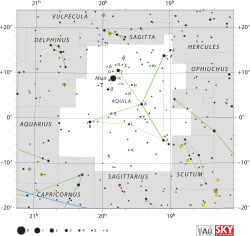Omega2 Aquilae
- For other star systems with this Bayer designation, see Omega Aquilae.

Location of ω2 (circled) | |
| Observation data Epoch J2000.0 Equinox J2000.0 (ICRS) | |
|---|---|
| Constellation | Aquila |
| Right ascension | 19h 19m 53.06650s[1] |
| Declination | +11° 32′ 05.8750″[1] |
| Apparent magnitude (V) | 6.023[2] |
| Characteristics | |
| Spectral type | A2 V[3] |
| U−B color index | +0.07[4] |
| B−V color index | +0.08[4] |
| Astrometry | |
| Radial velocity (Rv) | −26[5] km/s |
| Proper motion (μ) | RA: 43.77[1] mas/yr Dec.: 22.57[1] mas/yr |
| Parallax (π) | 12.27 ± 0.52[1] mas |
| Distance | 270 ± 10 ly (81 ± 3 pc) |
| Details | |
| Radius | 2.0[6] R☉ |
| Temperature | 8,936[7] K |
| Rotational velocity (v sin i) | 154[8] km/s |
| Other designations | |
Omega2 Aquilae (ω2 Aquilae, ω2 Aql) is the Bayer designation for a star in the equatorial constellation of Aquila, the eagle. It has an apparent visual magnitude of 6.0,[2] which is close to the lower limit of detectability with the naked eye. Accordingly to the Bortle Dark-Sky Scale, this star can be viewed from dark rural skies. As the Earth orbits about the Sun, this star undergoes a parallax shift of 12.27 mas.[1] This is equivalent to a physical distance of 270 light-years (83 parsecs) from Earth, give or take a 10 light year margin of error.
Analysis of the spectrum of this star shows it to match a stellar classification of A2 V,[3] indicating it is an A-type main sequence star. It is about double[6] the size of the Sun. The outer atmosphere is radiating energy at an effective temperature of 8,936 K,[7] giving it the white hue of an A-type star.[9] Omega2 Aquilae is spinning rapidly with a projected rotational velocity of 154 km/s.[8]
References
- ↑ 1.0 1.1 1.2 1.3 1.4 1.5 van Leeuwen, F. (November 2007), "Validation of the new Hipparcos reduction", Astronomy and Astrophysics 474 (2): 653–664, arXiv:0708.1752, Bibcode:2007A&A...474..653V, doi:10.1051/0004-6361:20078357.
- ↑ 2.0 2.1 2.2 "29 Aql -- Star", SIMBAD Astronomical Object Database (Centre de Données astronomiques de Strasbourg), retrieved 2012-07-21.
- ↑ 3.0 3.1 Cowley, A. et al. (April 1969), "A study of the bright A stars. I. A catalogue of spectral classifications", Astronomical Journal 74: 375–406, Bibcode:1969AJ.....74..375C, doi:10.1086/110819.
- ↑ 4.0 4.1 Osawa, K.; Hata, S. (1962), "Three-color photometry of B8-A2 stars (II).", Annals of the Tokyo Astronomical Observatory 7: 209, Bibcode:1962AnTok...7..209O.
- ↑ Evans, D. S. (June 20–24, 1966), "The Revision of the General Catalogue of Radial Velocities", in Batten, Alan Henry; Heard, John Frederick, Determination of Radial Velocities and their Applications, Proceedings from IAU Symposium no. 30, University of Toronto: International Astronomical Union, Bibcode:1967IAUS...30...57E.
- ↑ 6.0 6.1 Pasinetti Fracassini, L. E. et al. (February 2001), "Catalogue of Apparent Diameters and Absolute Radii of Stars (CADARS) - Third edition - Comments and statistics", Astronomy and Astrophysics 367: 521–524, arXiv:astro-ph/0012289, Bibcode:2001A&A...367..521P, doi:10.1051/0004-6361:20000451.
- ↑ 7.0 7.1 Caillo, A. (June 2010), "The PASTEL catalogue of stellar parameters", Astronomy and Astrophysics 515: A111, arXiv:1004.1069, Bibcode:2010A&A...515A.111S, doi:10.1051/0004-6361/201014247.
- ↑ 8.0 8.1 Royer, F.; Zorec, J.; Gómez, A. E. (February 2007), "Rotational velocities of A-type stars. III. Velocity distributions", Astronomy and Astrophysics 463 (2): 671–682, arXiv:astro-ph/0610785, Bibcode:2007A&A...463..671R, doi:10.1051/0004-6361:20065224.
- ↑ "The Colour of Stars", Australia Telescope, Outreach and Education (Commonwealth Scientific and Industrial Research Organisation), December 21, 2004, retrieved 2012-01-16.
External links
| |||||||||||||||||||||||||||||